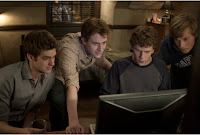1. Inside Job
 "Listening to the media echo chamber discuss President Obama's tax deal this week, I realized that it's been more than two months since I saw Charles Ferguson's illuminating Inside Job, and, shockingly, I think I still understand his deft explanation of the reasons behind the financial meltdown and, consequently, our current panic about tax rates and unemployment benefits. After numerous films - including but not limited to Capitalism: A Love Story (0/2 for Michael Moore after he dropped the health care ball with the forgettable Sicko), American Casino, Wall Street: Money Never Sleeps, and even The Other Guys - tried and failed to explain what led to The Great Recession, Ferguson's film was like a breath of fresh air, illustrating the financial foolishness in terms that anyone can understand. Good thing, too, because as I said in my pan of the meaningless Wall Street, this was probably the last chance The Recession Movie had to establish itself as a viable genre."
"Listening to the media echo chamber discuss President Obama's tax deal this week, I realized that it's been more than two months since I saw Charles Ferguson's illuminating Inside Job, and, shockingly, I think I still understand his deft explanation of the reasons behind the financial meltdown and, consequently, our current panic about tax rates and unemployment benefits. After numerous films - including but not limited to Capitalism: A Love Story (0/2 for Michael Moore after he dropped the health care ball with the forgettable Sicko), American Casino, Wall Street: Money Never Sleeps, and even The Other Guys - tried and failed to explain what led to The Great Recession, Ferguson's film was like a breath of fresh air, illustrating the financial foolishness in terms that anyone can understand. Good thing, too, because as I said in my pan of the meaningless Wall Street, this was probably the last chance The Recession Movie had to establish itself as a viable genre." 2. Restrepo
 "If Restrepo isn't the most visceral war film we've ever seen, it's at least the most visceral movie about the war in Afghanistan that we've yet seen, and the most insightful documentary on the 21st-century soldier's experience since The War Tapes...Restrepo almost seems to exist in a vacuum, like a fictionalized action movie (Predators, Avatar?) in which a dozen American soldiers accidentally land on another planet and have to fight for their lives. Of course, that's not the case. These are real twenty-somethings from Wisconsin, Florida, California, and elsewhere, fighting for their lives in a desolate valley on the other side of the world, wearing our flag on their shoulders, shooting at the trees in the hopes of killing unknown enemies who may or may not be connected to one of several networks that could be planning attacks against us somewhere on the planet and sometime in the near, or long-term, future. If this represents our very best attempt at securing American freedom and prosperity and liberating the world from themselves (that's the mandate we've proclaimed, right?), I'm afraid we should be deeply concerned."
"If Restrepo isn't the most visceral war film we've ever seen, it's at least the most visceral movie about the war in Afghanistan that we've yet seen, and the most insightful documentary on the 21st-century soldier's experience since The War Tapes...Restrepo almost seems to exist in a vacuum, like a fictionalized action movie (Predators, Avatar?) in which a dozen American soldiers accidentally land on another planet and have to fight for their lives. Of course, that's not the case. These are real twenty-somethings from Wisconsin, Florida, California, and elsewhere, fighting for their lives in a desolate valley on the other side of the world, wearing our flag on their shoulders, shooting at the trees in the hopes of killing unknown enemies who may or may not be connected to one of several networks that could be planning attacks against us somewhere on the planet and sometime in the near, or long-term, future. If this represents our very best attempt at securing American freedom and prosperity and liberating the world from themselves (that's the mandate we've proclaimed, right?), I'm afraid we should be deeply concerned.""Maybe I'm just a more observant viewer than most, but I would think that most focused movie-goers and critics would pick up on at least a few of these clues.But whether or not you feel like you've been unfairly taken for a ride, there are a few aspects of I'm Still Here that I think should be appreciated. First, the film shows us just how little the average person actually knew about Joaquin Phoenix to begin with; that we still don't know anything about the "real" him is fascinating to consider. Second, I'm Still Here probably chronicles the death of a Hollywood career as it would happen - as it does happen, to many former stars. Lastly, it demonstrates just how talented an actor Joaquin Phoenix is, playing an alternate version of himself in a much more committed way than, say, John Malkovich in Being John Malkovich. Few actors would ever take the risk to spend two years on a project like this, and I hope Phoenix's career is justly rewarded - even if Hollywood is bitter that the joke was always on them."






